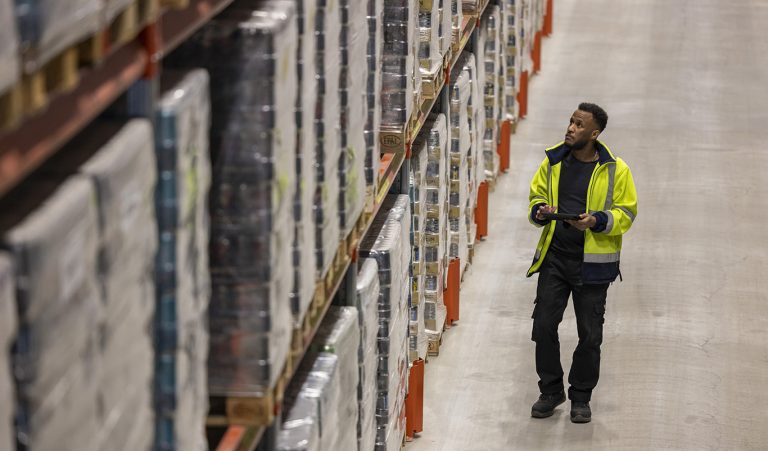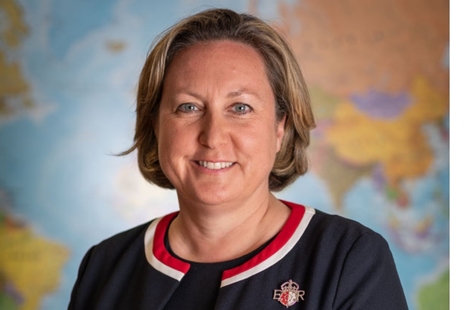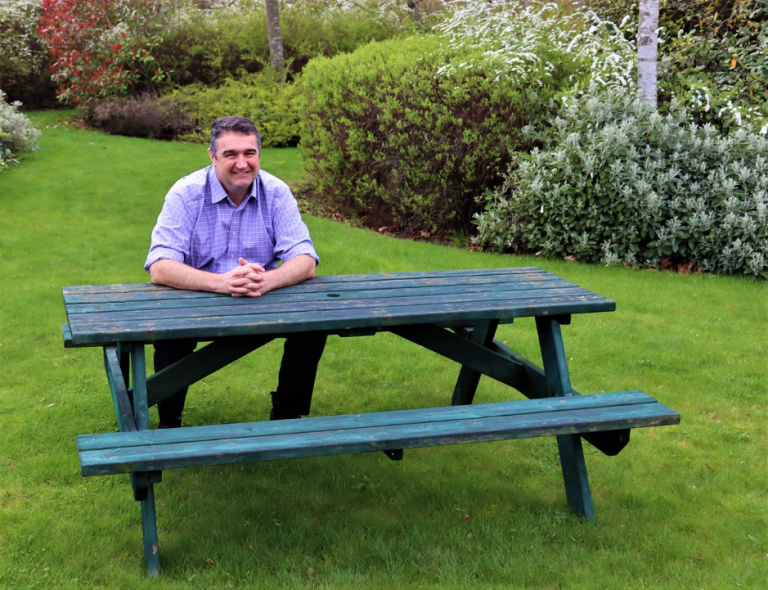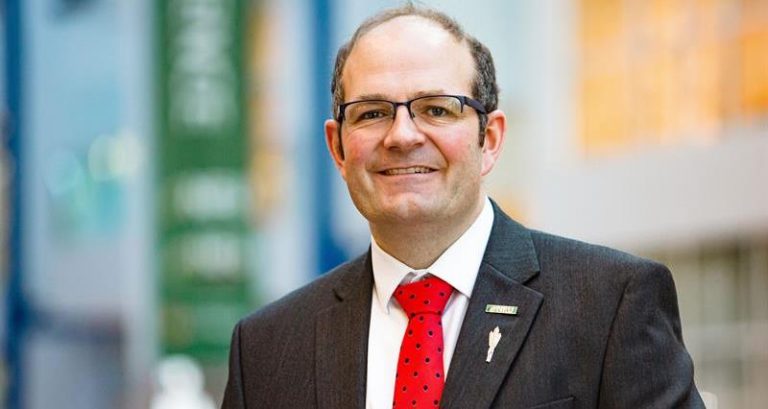Outlook upgraded as shipping company reports strong revenue growth
Shipping company DFDS upgraded its outlook for the full year on the back of strong revenue growth of 67% due to passengers returning much faster than expected and higher freight earnings, increasing EBITDA by 63%.
CEO Torben Carlsen said: “We delivered an excellent set of results for the second quarter with EBITDA increasing 63%. We are very satisfied with our performance across all business units, which demonstrates the resilience of our business and our ability to adapt to difficult market conditions. We improved our Logistics operating margins and delivered strong cash flow.
“In Ferry, volumes increased 4.1% driven by continued growth in Turkish exports to Europe, as well as an increase in capacity on our routes between Turkey and France and Turkey and Italy. We also saw passenger traffic return faster than expected as people were eager to travel again. Ferry travel also benefited from airline travel disruptions.”
While the current macroeconomic situation and continue, supply chain constraints create uncertainty regarding economic growth expectations in 2022, demand for freight services, which include to and from Grimsby and Immingham, remains robust. As a result, DFDS now expects to grow revenue by around 40% in 2022. This is based on the strong performance for the first half of 2022, higher bunker surcharge revenue, and continued recovery in passenger volumes.
Planning permission granted for new Huddersfield health campus
The University of Huddersfield has received a committee resolution from Kirklees Council to grant Reserved Matters planning permission, so that the construction of the prominent first phase building on the Southgate site that will become the home to the University’s new National Health Innovation Campus can proceed.
This follows a meeting of Kirklees Council’s Strategic Planning Committee, and the University is now looking forward to the issue of the formal decision notice so it can commence the development of the new 10,000 square metre first phase building.
It has been designed by locally-based architects AHR, who have previously worked with the University on the award-winning Barbara Hepworth Building and the Oastler Building.
This first phase of the Southgate development will include a new home for the Health and Wellbeing Academy.
The local community will also benefit from access to an award-winning podiatry clinic, a telehealth service, sports and physiotherapy clinics, parent and child clinics, mental health clinics and public-facing spaces dedicated to social science.
The new building represents a significant investment by the University, and will be the biggest construction project in the town as the construction of the University’s second-largest building proceeds.
The building will host a number of classrooms, labs and other specialist facilities for learning which will include:
- A mock-up operating theatre
- A mock-up ambulance known as a ‘simbulance’
- A community flat/dwelling that will replicate visiting patients at home
- The award-winning Podiatry Clinic, which will be open to the public
- Dedicated office and workspace for external partners
Changes on tariff rules predicted to lower costs for businesses and consumers
The Government has launched an import tariff regime expected to cut more than £750m from the cost of imports every year by reducing tariffs on hundreds of products exported from developing countries.
The Developing Countries Trading Scheme goes further than the EU’s Generalised Scheme of Preferences, and is on top of the thousands of products which developing countries can already export to the UK duty-free, and will mean 99% of goods imported from Africa, for example will enter the UK duty free.
The scheme means that a wide variety of products that aren’t widely produced in the UK will benefit from lower or zero tariffs.
Secretary of State for International Trade Anne-Marie Trevelyan said: “As an independent trading nation, we are taking back control of our trade policy and making decisions that back UK businesses, help with the cost of living, and support the economies of developing countries around the world.
“UK businesses can look forward to less red-tape and lower costs, incentivising firms to import goods from developing countries.”
The DCTS covers 65 countries across Africa, Asia, Oceania and the Americas including some of the poorest countries in the world. It removes some seasonal tariffs, meaning more options for British supermarkets and shops all year round. For example, cucumbers, which can’t be grown in the UK in the winter, will now be tariff-free during this period for the majority of countries in the scheme. The scheme also simplifies complex trade rules such as rules of origin – the rules dictating what proportion of a product must be made in its country of origin. This makes it easier for businesses like family-owned textile business DBL Group from Bangladesh to export, encouraging developing countries to play a larger role in the global trade community. Mohammed Jabbar, MD of DBL Group said: “These new rules will be a game changer for us. They mean we will be able to source our cotton from many more countries than we could before, which will make the business more competitive and our supply chains a lot more resilient.” This work is part of a wider push by the UK to drive a free trade, pro-growth agenda across the globe, using trade to drive prosperity and help eradicate poverty. This drive includes a new initiative called Platinum Partnerships, designed to grow trade between the UK and selected lower and middle-income Commonwealth countries and reduce dependency on aid. The partnerships will strengthen two-way green trade and investment, helping countries’ adaptation to climate change.Investment sees Vale of Mowbray crack Scotch Egg market
A pork pie brand has launched two new product ranges and expanded its North Yorkshire team by 30, thanks to funding from BEF and NPIF – BEF & FFE Microfinance, which is managed by BEF and Finance For Enterprise and part of the Northern Powerhouse Investment Fund.
Leeming’s Vale of Mowbray has built a new £4m production line and entered the Scotch Egg market, with the help of a £250,000 investment. This included £100,000 from NPIF – BEF & FFE Microfinance and £150,000 invested directly by BEF.
The new production line can produce up to 500 eggs per minute and has created 30 local jobs.
“We want to drive some much-needed quality into the Scotch Eggs category,” says Vale of Mowbray MD Mark Gatenby. “This is a real step-change for the market, and we are proud to be able to drive innovation and growth.”
Vale of Mowbray has been producing pies in its family-owned bakery in Leeming for 200 years.
Lee Vickers, investment manager at BEF, said: “Vale of Mowbray make 1.5 million pork pies each week. Our investment will help this family owned business grow their product range and profits at a time when many businesses in their sector continue to struggle.”
Simon Jackson, head of lending, BEF, said: “Our whole ethos is about supporting northern businesses as they grow and we know the struggles food manufacturers have faced over the last two years, so it was fantastic to be involved with such a legendary local company and help them expand and diversify.”
Bradford Council bids for £19m Level Up for Keighley
Bradford Council has revealed new details on its bold multi-million pound bid to Level Up Keighley to grow the local economy and create jobs.
The local authority has submitted an ambitious £19m bid designed to drive highly-skilled and paid jobs, open up much sought-after prime business space and upgrade an important commuter route into the town.
Working with education partners, Bradford Council has submitted a bid to give education and training a boost to drive high-skilled, highly-paid local jobs.
A new reconfigured and expanded Keighley College and Bradford University Advanced Manufacturing hub would support research and development in emerging technologies such as advanced robotics.
The high-tech Advanced Robotics and Engineering Institute facility would offer higher level skills and research and development, HNC, HND, Degree, Master; and PhD opportunities to stimulate local engineering innovation.
The council depot at Stockbridge would be demolished to create the reconfigured facilities and a large proportion of the site would be offered to entrepreneurs to create new advanced manufacturing and engineering businesses clustered around the college and university.
Over 34,000 square metres of prime business space could be opened up with the potential to host over 700 new jobs.
The funding is aimed at addressing abnormal cost constraints – prohibitive additional costs that have blocked development in the past.
The funded groundworks, flood alleviation, and site clearance could convert over 31,000 square metres of brownfield land into lucrative employment space at Beechcliffe, Airedale Park, Bradford Road East Walk Mill and Mariner Walk.
A further 3,000 square metres of employment floor space will be developed at Stockbridge as part of the AREI campus.
Bradford Council has submitted a proposal to transform the Keighley Worth Valley Railway into an enhanced rail transport hub offering workers a fast and efficient commute into the town.
This includes boosting capacity by restoring and upgrading two tracks and improving the rolling stock to produce a quick, comfortable and reliable link between Keighley and Oxenhope.
Councillor Susan Hinchcliffe, leader of Bradford Council, said: “Keighley remains a great place for businesses to grow and invest.
“The district is the UK’s number one Levelling Up opportunity and we have put in a significant amount of time and money into this bid to ensure it is compelling and competitive.
“These ambitious proposals include a range of recession-busting projects which, if supported by the Government, will make a significant difference to the area.”
James Hall takes sole charge of Key Capital Partners following three years as joint managing partner
Following three years as joint managing partner at Leeds-based lower mid market private equity firm Key Capital Partners, James Hall has taken sole charge of the firm.
Previous managing partner Owen Trotter steps away from day-to-day management responsibilities.
Owen was appointed managing partner of the firm in 2011 after founding the partnership with Mike Fell and Peter Armitage in 2007. James was appointed joint managing partner alongside Owen in 2019 in the first part of a structured succession plan that culminates in today’s announcement.
Since James joined the firm in 2015, Key has completed 12 new investments and exited 12 businesses. During that time, the investment team has helped numerous teams successfully grow, resulting in the generation of hundreds of jobs across the UK.
The 5 exits from the most recent fund (of Sparta Global, CMO, Routes and in recent weeks Avantis and YorkTest) have realised an average money multiple of 4.3x. In addition, the Key team has been strengthened with a number of new recruits across both the Leeds and London offices, as well as several promotions across investment, management and finance. Key has also raised two institutionally backed funds, allowing it to continue to focus on its core underserved SME market.
Commenting on the last 7 years, James Hall said: “I would like to thank Owen for his contribution to the firm over the past 11 years. Owen has been an integral part of the team, particularly in the early years. We look forward to Owen continuing to contribute to the firm in his role as a partner.
“I am also extremely proud of what Key and the management teams we have backed have achieved. We have invested in some outstanding businesses and supported their management to grow and thrive despite a multitude of global challenges.
“Significant recognition must go to the management teams who have steadfastly stuck to their beliefs, invested in people, systems and infrastructure and have built robust, exciting and sustainable businesses. We have loved being a part of it!
“I am looking forward to the next period of Key’s development and I am excited about what can be achieved in partnership with like-minded entrepreneurs with whom we share common values and goals for their businesses.”
South Yorkshire to get £570m government funding to spend on sustainable transport
The Department for Transport has awarded the South Yorkshire £570m to invest in sustainable transport schemes across the county, including several Sheffield initiatives.
The funding – City Region Sustainable Transport Settlement – will support schemes for the next five years and delivery will be managed by the South Yorkshire Mayoral Authority.
In Sheffield, Supertram will be improved and several priority bus routes will be established, including better active travel links to the north of the city, via the Northern General Hospital.
Wider schemes across the region will also have an impact on Sheffield’s transport facilities, including improvements to the bus network and the introduction of zero emission buses.
The latest funding complements the work already in progress in Sheffield through the Connecting Sheffield schemes, which aim to transform the city’s transport infrastructure to encourage walking, cycling and travel by public transport.
Cllr Julie Grocutt, Co-Chair of Sheffield’s Transport, Regeneration and Climate Policy Committee, said: “We are committed to safer and more sustainable travel and it is fantastic that Sheffield, as well as the wider region, has secured the funding it needs to see out its ambitions. We will work alongside the people of Sheffield through consultation to deliver these important changes.
“This year alone, through the Connecting Sheffield initiative, we have introduced the Sheaf Valley Cycle route and reintroduced the city centre shuttle bus, Sheffield Connect. We will continue to make progress towards a more sustainable and safer transport network both through the City Region Settlement and the Council’s already ambitious plans.
“As England’s fourth-largest city it is crucial we can offer a travel network that residents deserve, and it is more important than ever that the service on offer is sustainable in line with our goal of achieving net zero carbon by 2030.”
Value of UK exports plunges 8% during June
The value of good exported from the UK fell by 8% in June, coming as a damp squib at the end of what had been an otherwise strong quarter, according to the British Chambers of Commerce.
William Bain, Head of Trade Policy at the BCC, said: “The 8% fall in goods exports values in June was driven by a range of factors across fuel, chemicals, transport equipment and other manufactured goods, but there are gathering economic headwinds which all UK goods exporters now face.
“As well as general economic measures to support growth in the months ahead, this data shows the risks of weakening, instead of stabilising, our trade relations with the EU.
“There is now an urgent need for real delivery by the UK Government’s Export Strategy to support the growth ambitions of UK exporting businesses.”
Two months of stronger growth in goods exports came to a halt in June as overseas sales fell and the trade deficit widened.
April and May had both produced 7.4% month on month rises in UK goods exports but in June there was a fall of 8%.
EU goods exports were down by 3.9% (a rise in chemicals exports offset by lower machinery, transport equipment and fuels exports) and non-EU goods exports slumped by 11.9% (across many product categories including miscellaneous manufactured products).
The overall trade deficit in goods and services widened by £2bn in Q2 2022 to a record £27.9bn (£22.6bn excluding inflation).
Overall, in Q2 goods imports to the UK increased by 8.3% compared with Q1, and goods exports by 12.4%. UK goods export values to the EU rose across the quarter by 16.3% (strengths in fuel re-exports and ships, aircraft and mechanical machinery) and to the rest of the world by 8.6% even taking into account June’s disappointing data.
UK goods imports declined by 1.1% in June, driven largely by a 4.1% fall in goods imported from the EU (mainly in chemicals from the pharmaceutical sector) offset by a 2.1% rise in imports from the rest of the world (largely fuel import rises from the US and Norway).
Comparing trade performance in Q2 2022 with the same quarter 4 years previously, overall goods exports were 11% higher in Q2 2022, and imports 31% higher.
Lack of labour means fruit and veg worth £60m goes to waste, says NFU
The NFU says the results demonstrate the detrimental impact workforce shortages are having on the food and farming sector, resulting in significant crop losses at a time when the country is experiencing the worst cost-of-living crisis in generations.
NFU Deputy President Tom Bradshaw said: “It’s nothing short of a travesty that quality nutritious food is being wasted at a time when families across the country are already struggling to make ends meet because of soaring living costs.
“At the same time, the prolonged dry weather and record temperatures have created a really challenging growing environment for our fruit and veg. Every crop is valuable – to the farm business and to the people whose plates they fill. We simply can’t afford to be leaving food unpicked.
“With the demand on the Seasonal Workers Scheme expected to increase again next year, it’s vital the scheme has the capacity to facilitate the people the sector needs to pick, pack and process the country’s fruit and vegetables. This means increasing the number of visas available to meet the sector’s needs and expanding it to a minimum of a five-year rolling scheme to enable growers to have confidence to invest in their businesses – particularly given growth in the horticultural sector is a government ambition set out in the National Food Strategy.
“This survey has demonstrated just how crucial it is for fruit and veg growers to have access to the workforce they need. Expanding the Seasonal Workers Scheme will play a vital role in enabling that access and ensuring we don’t see this devastating level of food waste next year.”
Hull gets £120k grant to explore barriers to training and employment amongst the young
Hull City Council, The Warren, and Humber Learning Consortium have been successful in securing £120,000 grant funding from the Youth Futures Foundation.
The money will be used to undertake research into the mismatch between the high number of apprenticeship vacancies and job vacancies locally, compared with the high number of young people not in employment, education or training.
Hull is one of seven areas to receive a part of £16million for the research, which will last 18 months.
The Connected Futures research programme will be led by young people, and aims to join up multi-agency support for young people.
Councillor Linda Tock, Portfolio Holder for children’s services said: “I’m pleased Hull is to benefit from this funding and research. We hope that through the Connected Futures programme we can address barriers to employment for young people, through connected and consistent support that they need to get good jobs in the city.”
Danni, a young person at The Warren, said: “It’s great news. When we – as a group of young people – sat down with Youth Futures and told them how it was, it felt like it really hit home, it felt real – that we were heard and that we were trusted to know best about the reality of how it is for us.”












